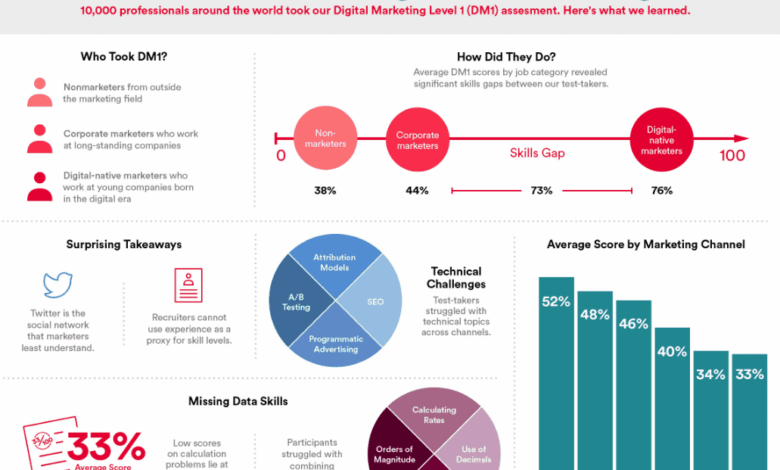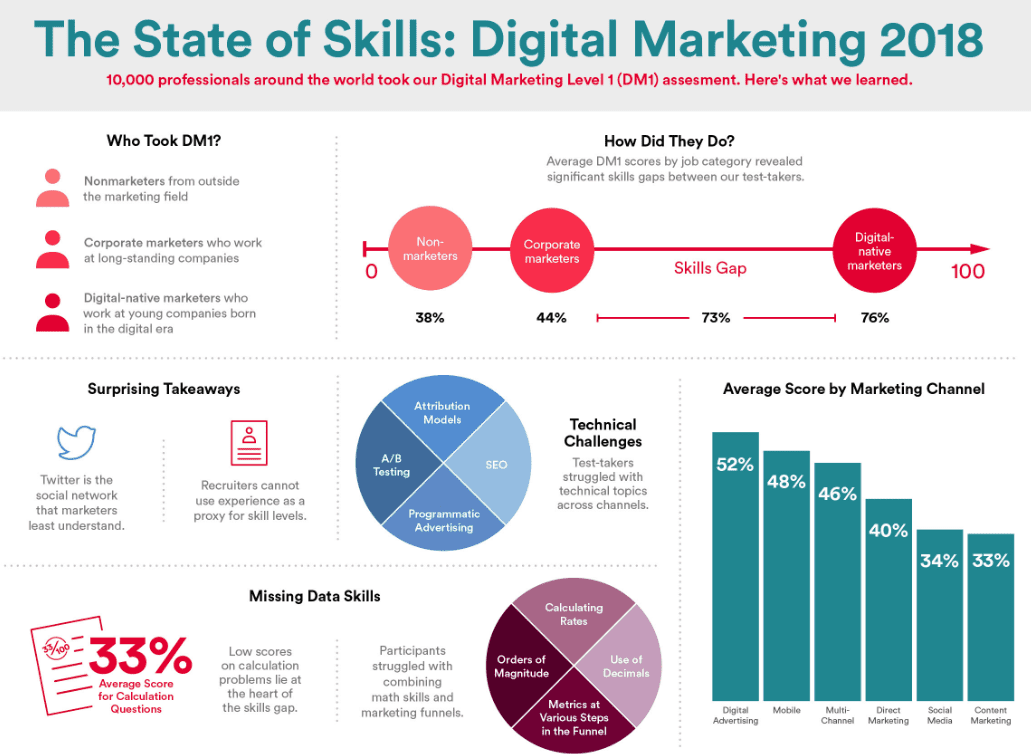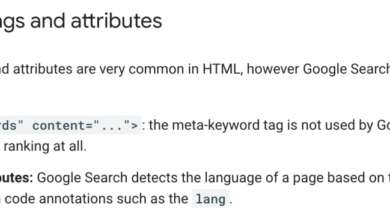
Digital Marketing Skills A Comprehensive Guide
Digital marketing skills are essential in today’s competitive landscape. This guide dives deep into the evolving world of digital marketing, exploring the core skills, their practical application, and future trends. From defining the fundamental concepts to examining emerging technologies like AI and automation, we’ll equip you with the knowledge to excel in this dynamic field.
We’ll cover everything from defining digital marketing skills and understanding their historical evolution to identifying essential skill categories and demonstrating how they intersect. Learning paths for various specializations, real-world application examples, and case studies will showcase the practical application of these skills. Finally, we’ll discuss the future of digital marketing and how to prepare for the inevitable changes ahead.
Defining Digital Marketing Skills
Digital marketing skills are no longer a luxury but a necessity for businesses in today’s interconnected world. These skills encompass a diverse range of abilities required to effectively utilize digital channels for brand promotion, customer engagement, and sales generation. From understanding the nuances of search engine algorithms to crafting compelling social media campaigns, the landscape of digital marketing is constantly evolving, demanding continuous learning and adaptation.The evolution of digital marketing skills has mirrored the rapid advancement of technology.
Initially focused on basic website creation and email marketing, the field has expanded to include intricate data analysis, sophisticated automation tools, and a deep understanding of user behavior. This evolution necessitates a dynamic skill set, encompassing technical proficiency, creative thinking, and strong analytical abilities.
Defining Digital Marketing Skills
Digital marketing skills are the abilities and knowledge required to leverage digital channels for marketing purposes. This encompasses a wide array of strategies, including search engine optimization (), search engine marketing (SEM), social media marketing, content marketing, email marketing, and more. It also involves an understanding of customer behavior, data analysis, and marketing automation. A robust digital marketing skillset allows businesses to connect with their target audience effectively and achieve their marketing objectives.
Key Components of a Robust Digital Marketing Skillset
A comprehensive digital marketing skillset comprises several key components. These include technical expertise, analytical thinking, creative problem-solving, and strong communication skills. Understanding the technical aspects of digital platforms, like website development, coding, and data analytics tools, is essential. The ability to interpret data, identify trends, and draw actionable insights is equally crucial. Effective communication is also vital for crafting compelling messages and engaging with the target audience across different platforms.
Examples of Digital Marketing Roles and Their Associated Skills
Various roles within digital marketing require specific skill sets. A Search Engine Optimization () specialist, for example, needs expertise in research, on-page optimization, link building, and technical . A Social Media Manager, conversely, requires strong communication, content creation, and community management skills. Similarly, a Digital Marketing Analyst needs proficiency in data analysis tools, reporting, and data visualization.
A Content Marketer should have a solid understanding of content strategy, writing, editing, and .
Comparison of Digital Marketing Specializations
| Specialization | Key Skills | Primary Focus | Typical Tools ||—|—|—|—|| (Search Engine Optimization) | research, on-page optimization, link building, technical , analytics | Enhancing organic search visibility | Google Search Console, SEMrush, Ahrefs || SEM (Search Engine Marketing) | Paid advertising, bidding, campaign management, A/B testing | Driving paid traffic through search engines | Google Ads, Bing Ads || Social Media Marketing | Content creation, community management, social listening, analytics, advertising | Engaging with audiences on social platforms | Hootsuite, Buffer, SproutSocial, Facebook Ads Manager || Content Marketing | Content strategy, writing, editing, , visual design, storytelling | Creating valuable content to attract and engage audiences | WordPress, Canva, Grammarly |This table highlights the differences and overlaps between various digital marketing specializations, demonstrating the diverse skill sets required in this field.
Each specialization necessitates a unique combination of skills to achieve optimal results within its specific focus area.
Essential Digital Marketing Skill Categories: Digital Marketing Skills
Digital marketing is a multifaceted field requiring a diverse skillset. Understanding the core categories and their interdependencies is crucial for success. A strong grasp of these categories allows marketers to create comprehensive strategies, optimize campaigns, and achieve tangible results.Digital marketing success hinges on a blend of technical proficiency and creative thinking. From understanding audience behavior to mastering analytics, each category contributes uniquely to a complete marketing strategy.
These categories aren’t isolated silos; they intersect and support each other, leading to more effective and impactful campaigns.
Content Creation and Marketing
Content creation is the cornerstone of many digital marketing strategies. High-quality content attracts, engages, and converts potential customers. Effective content marketing requires understanding target audiences, crafting compelling narratives, and optimizing content for search engines. This includes diverse formats like blog posts, articles, videos, infographics, and social media updates.
- Understanding Target Audience: Marketers need to identify their ideal customer profile, analyzing their needs, preferences, and online behavior. This crucial step informs the development of content that resonates with them.
- Crafting Compelling Narratives: Storytelling is key to connecting with audiences. Effective content marketing tells engaging stories that highlight product benefits and build brand loyalty.
- Optimization: Optimizing content for search engines is essential to drive organic traffic. s, meta descriptions, and site structure all contribute to search engine rankings.
Search Engine Optimization ()
is the process of improving a website’s visibility in search engine results pages (SERPs). A strong strategy drives organic traffic, leading to increased brand awareness and potential customers.
- Research: Identifying relevant s that users search for is fundamental to ranking higher in search results. Tools like SEMrush and Ahrefs help in this process.
- On-Page Optimization: Optimizing website elements like title tags, meta descriptions, and header tags improves search engine crawlers’ understanding of website content.
- Off-Page Optimization: Building backlinks from reputable websites enhances a website’s authority in the eyes of search engines, improving search rankings.
Social Media Marketing
Social media marketing leverages platforms like Facebook, Instagram, Twitter, and LinkedIn to engage with audiences and promote products or services. It fosters brand loyalty, generates leads, and builds brand awareness.
- Platform Selection: Choosing the right social media platforms is vital. Understanding where your target audience spends their time online is crucial.
- Content Strategy: Creating engaging and relevant content for each platform is key to driving interaction and brand awareness.
- Community Management: Responding to comments, messages, and feedback effectively builds relationships and fosters brand loyalty.
Pay-Per-Click (PPC) Advertising
PPC advertising, like Google Ads, allows businesses to display ads on search engines and other websites, targeting specific s and demographics. It’s a highly effective way to drive immediate traffic and conversions.
Mastering digital marketing skills is crucial in today’s business landscape. Looking at successful figures like Tracee Larocca, SVP Marketing at Taco Bell, tracee larocca svp marketing taco bell , we see firsthand the power of innovative strategies. Her experience highlights the importance of strong digital marketing skills in driving brand growth and consumer engagement.
- Campaign Setup: Setting up targeted campaigns with relevant s, bids, and landing pages is crucial for successful PPC advertising.
- Ad Copywriting: Crafting compelling ad copy that grabs attention and encourages clicks is essential to maximizing ROI.
- Budget Management: Effective budget allocation and tracking are vital to ensure campaigns stay within budget and deliver the best possible return.
Analytics and Reporting
Tracking and analyzing website traffic, user behavior, and campaign performance is essential for measuring success and making data-driven decisions. It helps to understand what works and what doesn’t.
- Key Performance Indicators (KPIs): Identifying relevant KPIs (e.g., website traffic, conversion rates, click-through rates) is crucial for evaluating campaign performance.
- Data Interpretation: Analyzing data to identify trends and patterns provides insights into customer behavior and campaign effectiveness.
- Reporting and Visualization: Presenting data in a clear and concise manner using tools like Google Analytics is vital for communicating insights to stakeholders.
Email Marketing
Email marketing remains a powerful tool for nurturing leads, building relationships, and driving sales. A well-executed email strategy can significantly improve customer engagement.
- List Building: Building an engaged email list is crucial to the success of email marketing.
- Email Segmentation: Segmenting email lists allows for personalized communication and targeted messaging, improving engagement and conversions.
- Automation: Automating email sequences for onboarding, promotions, and customer service can save time and resources, while boosting efficiency.
Tools and Technologies
| Skill Category | Tools and Technologies |
|---|---|
| Content Creation | WordPress, Canva, Grammarly, Adobe Creative Suite |
| Google Search Console, SEMrush, Ahrefs, Moz | |
| Social Media Marketing | Hootsuite, Buffer, Sprout Social, Facebook Ads Manager |
| PPC Advertising | Google Ads, Bing Ads, social media ad platforms |
| Analytics and Reporting | Google Analytics, Mixpanel, Tableau, Matomo |
| Email Marketing | Mailchimp, Constant Contact, SendGrid |
Developing and Improving Digital Marketing Skills
Mastering digital marketing requires a continuous commitment to learning and adaptation. The ever-evolving landscape of online platforms and strategies necessitates a proactive approach to skill enhancement. This involves not just acquiring knowledge, but also practicing and applying it to real-world scenarios. This process is crucial for staying competitive and achieving success in the field.A deep understanding of the principles of digital marketing, coupled with practical application and continuous learning, is essential for thriving in this dynamic industry.
This involves identifying areas needing improvement, seeking out relevant resources, and implementing effective learning strategies.
Step-by-Step Process for Skill Acquisition
A structured approach to skill development is key. Begin by identifying specific areas needing improvement, whether it’s , social media management, or content creation. Next, create a learning plan outlining the steps required to achieve your goals. This could involve completing online courses, reading industry publications, or participating in workshops. Regular practice is crucial; apply newly acquired skills to real-world projects or tasks.
Finally, gather feedback and analyze results to refine your approach. This iterative process ensures ongoing improvement and growth.
Resources for Skill Development
Numerous resources are available to aid in skill development. Online courses offered by platforms like Coursera, Udemy, and HubSpot provide structured learning experiences. Certifications from organizations like Google and Hootsuite validate expertise and demonstrate proficiency. Industry blogs and podcasts offer valuable insights into current trends and best practices. Networking with professionals in the field through online communities and industry events fosters knowledge exchange and provides valuable perspectives.
Importance of Continuous Learning and Adaptation
Digital marketing is a dynamic field. Staying current with evolving algorithms, new platforms, and emerging technologies is paramount. Continuous learning ensures you’re equipped to adapt to changing market demands and capitalize on opportunities. Regularly reviewing industry publications, attending webinars, and participating in online communities helps maintain a proactive approach to skill enhancement. The ability to adapt to change is essential for success in this rapidly evolving landscape.
Examples of Successful Skill Development Strategies
One successful strategy involves leveraging online courses to gain a comprehensive understanding of principles. Another involves participating in social media marketing challenges to hone practical application skills. Tracking and analyzing campaign performance through Google Analytics helps refine strategies based on real-world results. The key is to find methods that align with your learning style and integrate learning into your daily workflow.
Learning Paths for Digital Marketing Specializations
| Specialization | Learning Path |
|---|---|
| Search Engine Optimization () | Fundamentals of , research, on-page optimization, off-page optimization, technical , Google Analytics, tools |
| Social Media Marketing | Platform-specific strategies, content creation, social listening, community management, social media advertising, analytics tools |
| Content Marketing | Content strategy, content creation, -friendly content, content distribution, analytics for content performance |
| Email Marketing | Email marketing platforms, email list building, email campaign creation, email deliverability, A/B testing, email analytics |
| Pay-Per-Click (PPC) Advertising | Ad platform knowledge, research, campaign setup, bidding strategies, ad copywriting, performance tracking, A/B testing |
Practical Application of Digital Marketing Skills
Digital marketing isn’t just about fancy tools and algorithms; it’s about understanding your audience, tailoring your approach, and consistently measuring results. Effective application of digital marketing skills hinges on a deep understanding of different business models and the ability to adapt strategies to various industries. This involves not only knowing the tools but also grasping the nuances of customer behavior and leveraging data to drive improvement.Successful digital marketing campaigns are built on a strong foundation of well-defined goals, target audiences, and data-driven insights.
A marketer who understands these principles can optimize campaigns to maximize return on investment (ROI). This requires a keen eye for emerging trends and a commitment to continuous learning.
Application in Different Business Models
Different business models require different digital marketing approaches. For example, a subscription-based service might focus on building a loyal customer base through email marketing and targeted ads, while an e-commerce store might prioritize search engine optimization () and paid advertising to drive traffic and conversions. Understanding the unique needs of each model is crucial for successful implementation.
Examples of Successful Digital Marketing Campaigns, Digital marketing skills
Numerous campaigns have demonstrated the power of targeted digital marketing. One example is Dollar Shave Club’s viral video, which effectively leveraged social media to create a strong brand identity and attract a large customer base. This campaign successfully combined a strong video with targeted advertising. Another example is the use of personalized email campaigns by companies like Amazon to enhance customer experience and boost sales.
Digital marketing skills are super important these days, and one key area is social media growth. To really boost your Instagram presence, check out my top picks for tools to quickly grow followers and engagement. My top Instagram tools to quickly grow followers and engagement will help you understand the power of these tools to supercharge your overall digital marketing strategy.
Knowing how to leverage these tools will improve your digital marketing campaigns and bring a lot more value to your business.
These campaigns highlight the importance of understanding customer preferences and tailoring messages accordingly.
Tailoring Digital Marketing Skills to Different Industries
The digital marketing approach needs to be adjusted based on the industry. A B2B SaaS company will likely focus on content marketing and lead generation strategies, whereas a fashion retailer will prioritize visual marketing and social media engagement. Adapting techniques to align with industry-specific customer needs and online behavior is crucial for achieving desired results.
Developing strong digital marketing skills is crucial in today’s market. It’s fascinating to see how those skills translate into real-world success, like with Leslie Ferraro, CMO at Hershey Entertainment Resorts, leslie ferraro cmo at hershey entertainment resorts. Her experience highlights the importance of a well-rounded digital strategy for engaging audiences and driving results. Ultimately, these skills are essential for any business looking to thrive online.
Understanding Target Audiences and Online Behavior
Knowing your target audience is paramount. Understanding their online behavior – which platforms they use, what content they consume, and what their pain points are – is essential for crafting effective campaigns. Analyzing website analytics, social media engagement, and customer feedback provides invaluable insights into how customers interact with brands online. Understanding their needs allows for crafting more relevant messages that resonate deeply with them.
This in turn, fosters stronger connections and builds trust.
Analyzing Data and Metrics to Improve Strategies
Digital marketing is inherently data-driven. Tracking key metrics like website traffic, conversion rates, and customer engagement is essential for evaluating campaign performance. By analyzing this data, marketers can identify what’s working, what’s not, and adjust strategies accordingly. This continuous cycle of analysis and adaptation is key to optimizing ROI and ensuring long-term success.
The Future of Digital Marketing Skills

The digital marketing landscape is in constant flux, driven by emerging technologies and evolving consumer behavior. Staying ahead requires a proactive understanding of future trends and a commitment to continuous learning. This exploration delves into the evolving skills needed to thrive in this dynamic environment.The future of digital marketing hinges on adaptability and a willingness to embrace new technologies.
Success will depend not just on mastering existing tools, but also on the ability to quickly learn and apply emerging technologies. Prospective marketers must anticipate how these advancements will reshape strategies and campaigns.
Emerging Trends and Technologies
Digital marketing is being reshaped by several key trends. The increasing importance of personalization, the rise of AI-powered tools, and the growing emphasis on user experience are transforming how brands interact with their audiences. Understanding these developments is critical for staying competitive. The integration of augmented reality (AR) and virtual reality (VR) into marketing strategies is also gaining momentum, creating immersive experiences for consumers.
Future Skill Requirements
The evolving nature of digital marketing demands a diverse skill set. Proficiency in data analytics and interpretation will become even more crucial, as brands rely on data to inform decisions and optimize campaigns. The ability to create compelling content tailored to specific user segments is also paramount. Expertise in , social media management, and paid advertising will remain essential, but the way these are applied will adapt.
Preparing for the Evolution
Continuous learning is essential in the ever-changing digital world. Marketers must actively seek out opportunities to enhance their skill sets. Staying abreast of new tools and technologies through online courses, workshops, and industry events is crucial. Networking with other professionals in the field provides valuable insights and knowledge sharing. Mentorship programs can offer guidance and support as marketers navigate the complexities of the digital landscape.
Impact of AI and Automation
Artificial intelligence (AI) and automation are poised to significantly impact current digital marketing skills. AI-powered tools can automate tasks like content creation, social media scheduling, and email marketing. Marketers need to adapt by focusing on tasks requiring human judgment and creativity. This includes developing strategies for effective AI integration, analyzing results, and ensuring ethical use of these tools.
Instead of replacing human roles, AI is meant to enhance them by automating routine tasks and freeing up time for strategic planning and creative endeavors. Marketers will need to understand the technical aspects of AI implementation in marketing workflows, but their core function will remain the development and execution of creative and strategic campaigns.
Adaptability and Continuous Learning
Adaptability is paramount in the digital age. The ability to quickly learn new technologies and adjust strategies to changing market conditions is critical for success. Continuous learning through online courses, industry events, and self-directed study will ensure marketers stay relevant and competitive. Embracing a mindset of continuous improvement will allow professionals to effectively leverage emerging technologies and remain ahead of the curve.
Case Studies in Digital Marketing Success

Digital marketing is a dynamic field, constantly evolving with new tools and strategies. Understanding how successful campaigns are built provides valuable insights into effective application of digital marketing skills. Case studies offer practical examples of how businesses have leveraged these skills to achieve their objectives, highlighting the strategies, challenges, and ultimately, the success factors. Examining these real-world scenarios offers a wealth of knowledge for aspiring and established marketers alike.Effective digital marketing campaigns aren’t just about employing the latest trends; they require a deep understanding of the target audience, a well-defined strategy, and a meticulous execution plan.
Analyzing successful case studies reveals the importance of aligning digital marketing efforts with broader business goals, demonstrating how effective strategies can drive measurable results.
Examples of Successful Digital Marketing Campaigns, Digital marketing skills
Successful digital marketing campaigns often combine several key skills, such as content marketing, , social media management, and paid advertising. Understanding how these skills are integrated and executed is critical for effective marketing.
- Airbnb’s Growth through Content Marketing and Community Building: Airbnb effectively used a multi-faceted approach, leveraging content marketing and community building on social media. They produced engaging travel guides, blog posts, and videos that showcased user-generated content, fostering a strong sense of community among travelers and hosts. This content marketing strategy not only attracted new users but also built trust and brand loyalty. Key factors in their success included authenticity, engaging visuals, and a consistent brand voice across all platforms.
- Nike’s Influencer Marketing Strategy: Nike effectively utilized influencer marketing by partnering with athletes and celebrities to promote their products. These collaborations often involved creating unique and engaging content that resonated with the target audience. Nike’s success is rooted in the authenticity of the partnerships, ensuring the influencers’ messages align with the brand’s values and aesthetic. This approach helped build brand awareness and generate significant sales.
- Dollar Shave Club’s Viral Marketing Campaign: Dollar Shave Club’s viral marketing campaign utilized humor and simplicity to gain rapid traction. Their humorous video, combined with a straightforward value proposition, resonated deeply with their target demographic, generating significant buzz and organic reach. The success of this campaign stemmed from a well-defined value proposition, a captivating narrative, and a clever execution strategy.
Key Factors Contributing to Success
Analyzing successful campaigns reveals key factors that consistently contribute to positive outcomes. Understanding these elements allows marketers to refine their strategies and improve their results.
- Clear Objectives and KPIs: Defining clear objectives and measurable key performance indicators (KPIs) is crucial. This ensures that marketing efforts are directly aligned with business goals, and progress can be tracked effectively.
- Understanding the Target Audience: Deep understanding of the target audience’s needs, interests, and online behavior is fundamental. This knowledge allows marketers to tailor their messaging and strategies to resonate effectively with the intended audience.
- Strategic Content Creation: Creating high-quality, engaging content is essential. Content should provide value, address audience needs, and maintain brand consistency.
Challenges and Solutions
Every campaign faces unique challenges. Recognizing and overcoming these challenges is critical for achieving success.
- Budget Constraints: Limited budgets often necessitate creative solutions. Marketers can leverage free or low-cost strategies like social media marketing, content creation, and to maximize impact with restricted resources.
- Measuring ROI: Tracking and measuring return on investment (ROI) can be challenging. By establishing clear KPIs and utilizing analytics tools, marketers can effectively assess the impact of their campaigns and adjust strategies accordingly.
- Keeping Up with Trends: The digital marketing landscape is constantly evolving. Staying updated with emerging trends, technologies, and best practices is crucial for adapting and maintaining effectiveness.
Comparative Analysis of Case Studies
This table summarizes the key strategies and skills employed in the highlighted case studies.
| Case Study | Primary Strategy | Key Digital Marketing Skills | Challenges Faced | Solutions Implemented |
|---|---|---|---|---|
| Airbnb | Content marketing, community building | Content creation, social media management | Building trust and brand recognition | Authentic content, user-generated content |
| Nike | Influencer marketing | Influencer outreach, content creation | Authenticity, ROI tracking | Partnerships aligned with brand values, data-driven strategies |
| Dollar Shave Club | Viral marketing | Video marketing, content creation, social media | Scaling up operations, maintaining initial momentum | Consistent messaging, strong online presence |
Final Wrap-Up
In conclusion, mastering digital marketing skills requires a deep understanding of the constantly evolving landscape. This guide has provided a comprehensive overview of the key concepts, practical applications, and future trends. By consistently adapting and learning, you can leverage these skills to achieve success in the dynamic world of digital marketing. Continuous learning and a forward-thinking approach are crucial for thriving in this field.





